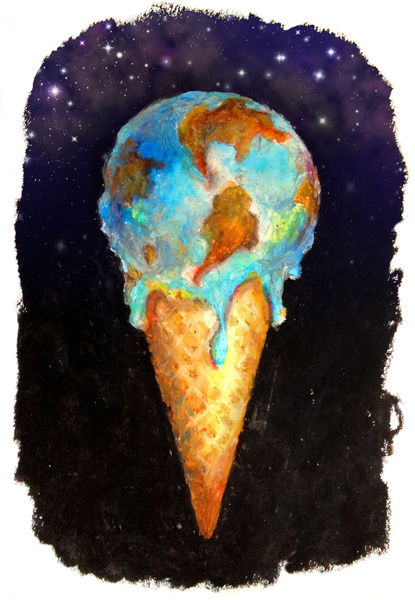 Another Friday — yippee!
Another Friday — yippee!
Clear this early morning on California’s north coast and in the words of the lady at my bank yesterday: “Tomorrow’s the first of November. What’s up with that?”
Yeah, what’s that shit? Time appears to be galloping hard toward some shining point in the way-near future, but what point is that unless it’s pointed out to us?
Duh!
Yet as far as our earth is concerned, speed kills.
Via Grist: While the amount of change is not greater than some historical variations, the rate of change is unnaturally fast. “That rate of change in ocean heat content is 15 times greater now than it’s been in the last 7,000 or 8,000 years.”
And what happens when the oceans reach a certain temperature?
No one seems to know that answer.
The above quote comes from a new study on ocean warming and was published yesterday in Science. Although the research doesn’t answer some heavy-shit questions, like what now? Or what effect will this have on the overall climate change catastrophe happening as I type?
The lead author in the study, Yair Rosenthal, a professor of marine and coastal sciences in Rutgers’ School of Environmental and Biological Sciences, did say this: “We may have underestimated the efficiency of the oceans as a storehouse for heat and energy, It may buy us some time – how much time, I don’t really know – to come to terms with climate change. But it’s not going to stop climate change.”
Dude, we knew that already.
All these science nerds can tell us is some bad shit is happening and there’s a short window of opportunity to do something about it or else. For years, these guys have been broadcasting loud and clear about it, but still nothing and because of the way the word operates, we be fucked.
Paul Mayewski, the director of the Climate Change Institute at the University of Maine and the science adviser for GlobalPost’s yearlong investigation Calamity Calling, in an interview last week at Salon had this note:
I’m co-teaching a class in abrupt climate change business and policy and we keep talking about visuals, victims and villains.
The way that the media and many of us portray things.
The visuals are clear.
The victims are clear — they’re us, all over the place in varying degrees.
One of the big problems is that we’re all the villains.
We’ve all wanted this sort of lifestyle.
But this is one of those situations in which we actually have to forget about who the villains are.
We have to treat this almost like an extraterrestrial threat.
The movie “Independence Day” is a great movie because of the message that the only way the world gets together is when everybody realizes they’re being threatened in the same way.
In the case of the modern interpretation of climate change, we’re not actually all threatened in the same way, but we all have the same kind of security issues.
For some of us it’s storms, for some of us it’s drought, for others it’s heatstroke and disease.
The faster we get that message out, the faster we realize that we are in fact being attacked by this thing that we have created ourselves.
And time is of the essence, especially with water boiling on the store.